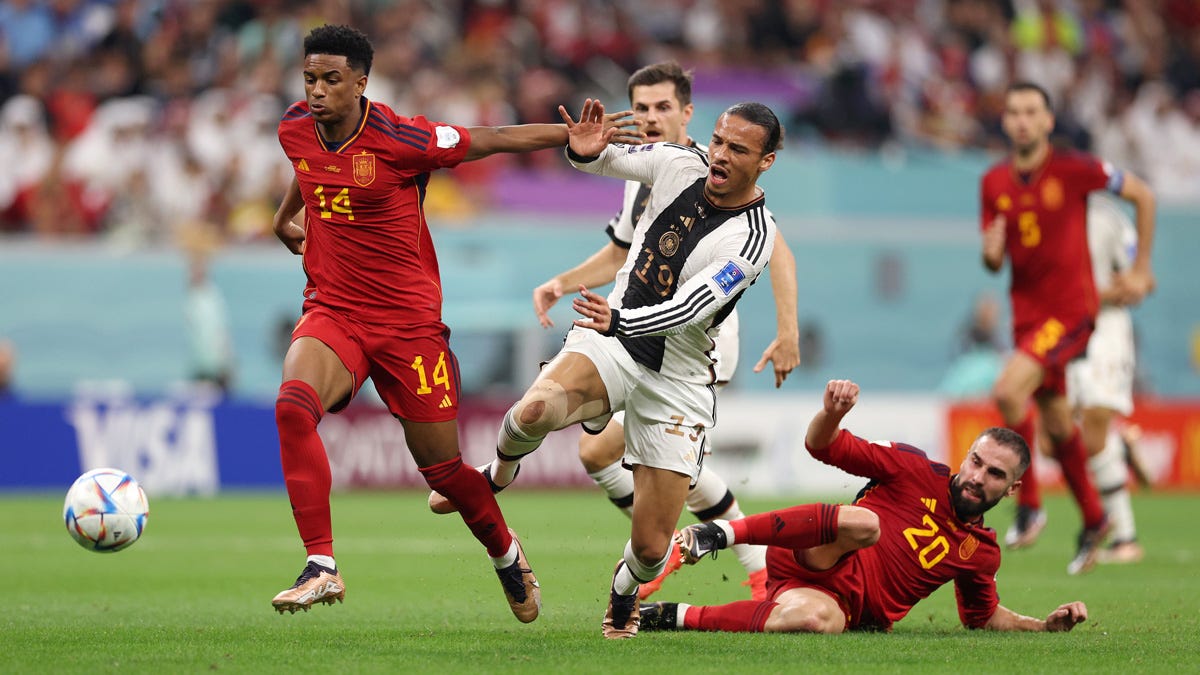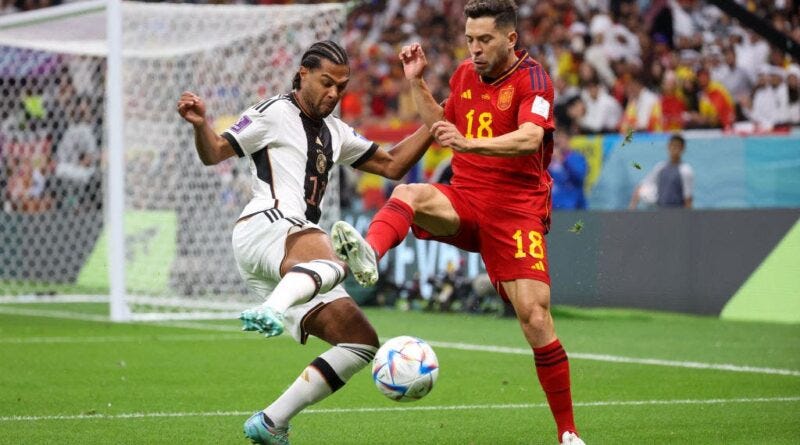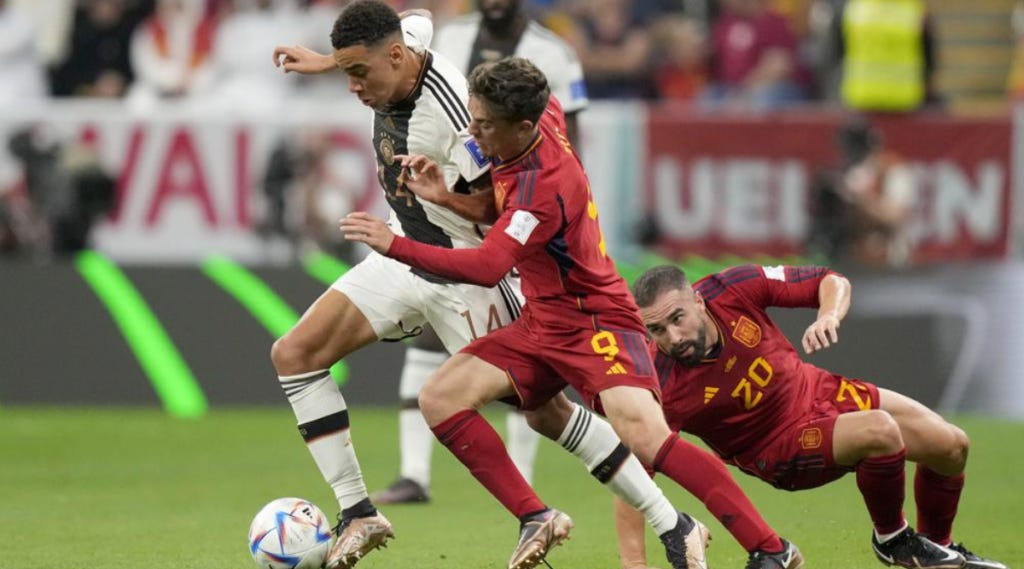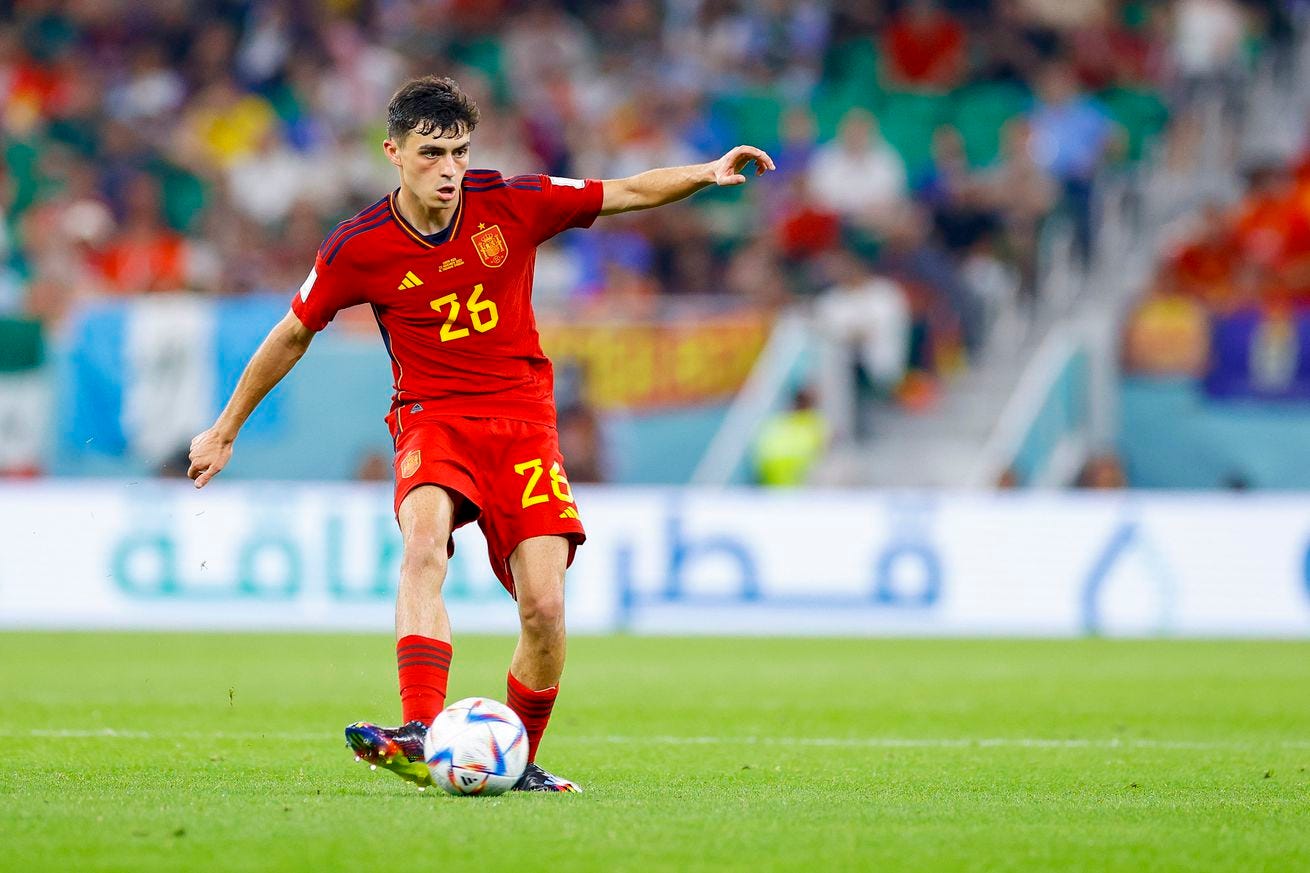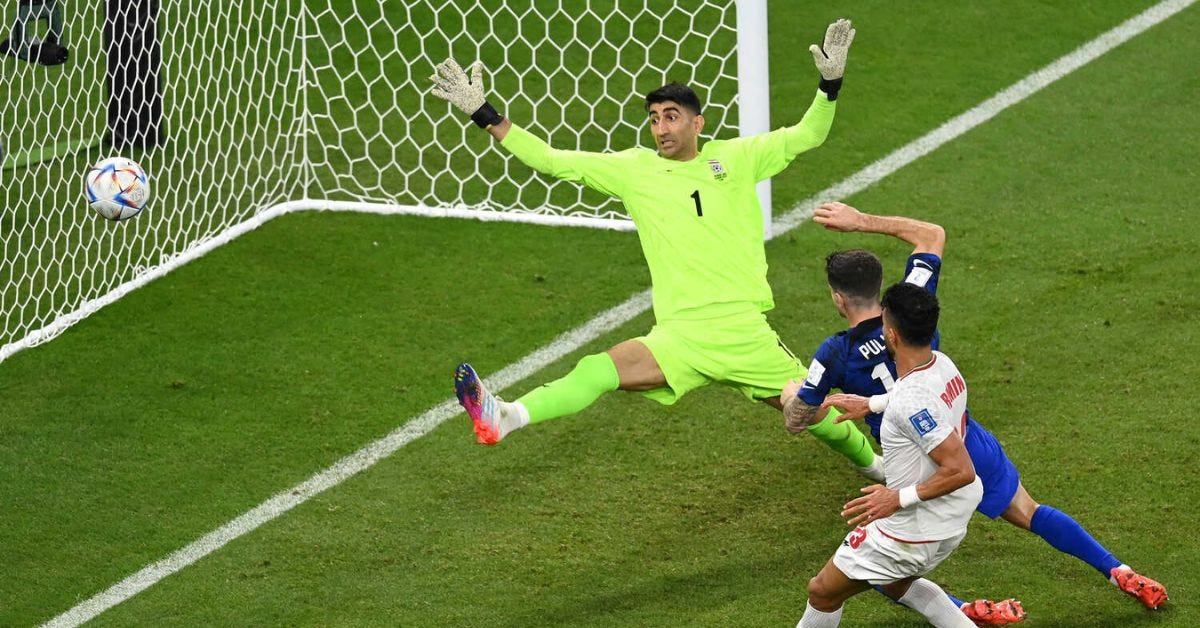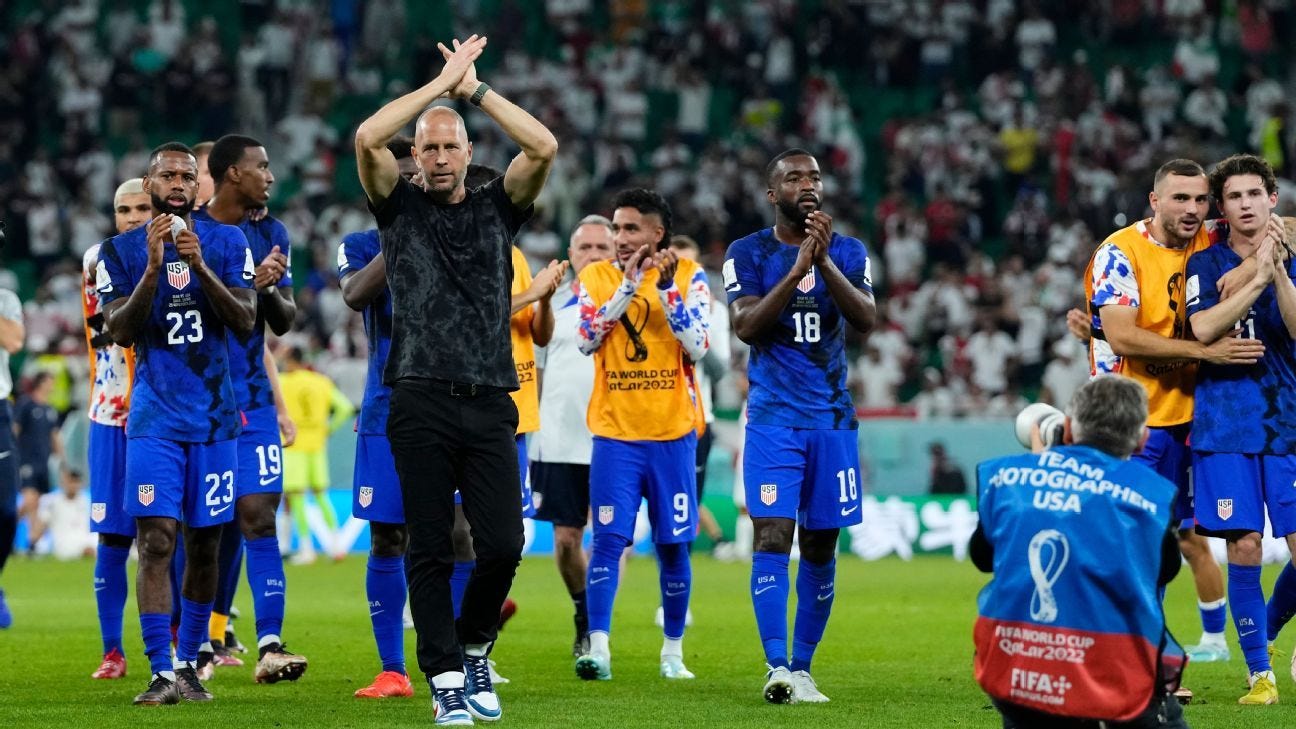Soccer Isn't Life, Except When It Is
When the game extends beyond the lines, nothing good can happen
If you live outside the US and Canada, you’re probably already passionately wrapped up in it, but the 2022 World Cup in Qatar has featured some of the best competitions the sport of soccer/futbol has to offer. Hell, England and the US made a 0-0 draw scintillating, something most Americans find impossible to understand.
Trust me on this one. For those who find baseball fascinating, at least soccer has non-stop action (and yes, I enjoy baseball).
I admit that I’m a YUUUUUGE soccer nerd. I was a goalkeeper in college and am a lifetime member of the Goalkeeper’s Union. In addition, I’ve coached the sport at the high school level, and my wife and I have season tickets for Portland Timbers FC of Major League Soccer.
I know the game inside and out. I can differentiate the intricacies of a 3-4-3 from a 4-1-3-2 and explain the difference between zonal and man marking on a corner kick. But, as a former goalkeeper, I watch the game like someone who’s seen the game from the six-yard box- and though I haven’t stopped a shot in anger in 40 years, I still miss that feeling. Man, do I miss feeling that fear in the pit of my stomach and the excitement that came with it. I miss everything about it every time I watch a match. I’ve experienced nothing like it in my life- except for that one time in band camp. Or maybe when I was on the front lines in Croatia. Or that time I came close to losing my life while climbing Mt. Hood.
Ah, but I digress….
I’ve watched almost every game at this World Cup save for the games that start at 2 a.m. Pacific Time, and I’ve even seen one of those. None of them, with the possible exception of England v. US, which came close, can hold a candle to Germany v. Spain. Though the match ended as a 1-1 draw, it contained as much drama, physicality, and sheer determination as any match I’ve had the privilege to watch.
And I did feel privileged to watch it. It was a clash of former World Cup champions who had the misfortune to be drawn into the same group. That being the case, the game had intense significance. A loss could mean one of the sides might end up not making it through to the knockout round. A draw would complicate that process.
With that in mind, each side warily eyed the other in the moments before kickoff, experienced warriors knowing they would have to take the fight to the other if they were to emerge victorious. Moreover, both sides understood that to win, they would have to endure an intensity of will and resistance unlike anything they’d encountered before.
They were about to discover that even then, they were wholly unprepared for the onslaught their adversaries would unleash upon them. It began as soon as the referee’s whistle blew to start the match, and it didn’t let up until he blew to end it.
The statistics don’t begin to tell the story. Only 24 fouls were whistled, and four yellow cards were issued, but the game was brutally physical from beginning to end. No quarter was given because none was requested. Everyone on the pitch, from starters to substitutes, knew what was at stake. And they were willing to give everything they had for it.
Germany, who’d lost a 2-1 stunner to Japan in its opening match, played like a desperate side. They knew that if they lost, they might be eliminated from the tournament, something that had never happened to a German side before. Germany had always made it out of its groups and had often gone on to experience great success.
Spain had decimated a decent Costa Rican side 7-0 in its opening match. The Spaniards play a style of soccer that fascinates me because it seems so simple yet is deceptively difficult to execute effectively. Some call it “Death by a Thousand Cuts,” which is not altogether inaccurate. Watch Spain play, and the first thing you’ll notice is their patience. They move the ball around with short, short passes, side to side, and front to back. It’s incredibly frustrating for the team playing defense because all they’re doing is chasing the ball all over their defensive half.
Good teams may accumulate 400-500 passes over the course of a game. It’s not unusual for Spain to put up over 1000, which is what they did against Costa Rica. This accomplishes two things- first, it keeps the ball away from Spain’s opponent, which means that second, they can’t score if they don’t have the ball.
Their “Death By A Thousand Passes” style is beautiful to watch, but incredibly frustrating and exhausting to defend against. Costa Rica was wholly unprepared for what Spain unleashed on them.
Of the teams in the World Cup tournament, Germany may be best suited to countering Spain’s tactical brilliance. Germany plays a similar style, though not with the same short, sharp passing. They play with equal patience, however, and they do an excellent job of probing to find an opponent’s weak spot.
The Germans don’t get flustered or frustrated by Spain’s style of ball movement. They accept that Spain will dominate possession. So they try to force the Spaniards to move the ball around the perimeter, where they’re far less likely to do any damage. It’s more difficult to score from distance, so the Germans focus on keeping the ball away from their 18-yard box.
Spain has far more offensive flair than Germany, but the Germans are more solid defensively, so this match quickly settled into an immovable object vs. unstoppable force rhythm.
After a first half played to a ferocious, relentless draw, each side nicked the other for a goal in the second half. Alvaro Morata scored for Spain in the 62nd minute and Niclas Füllkrug in the 83rd for Germany. The last five minutes plus stoppage time was not for the faint of heart, as every field player left everything they had on the pitch in search of a goal. In the end, a 1-1 draw seemed a fair, if unsatisfying, reflection of the night’s combat physique.
Then there was yesterday’s USA-Iran match, one the Americans had to win to advance to the knockout round. Iran needed only a draw to advance, and it showed in how they played.
It was clear from the opening whistle that Iran wasn’t about to take unnecessary chances. They dropped nine men into their 18-yard box and had one forward near midfield. This meant the Americans dominated possession early but couldn’t get the ball into dangerous areas where good scoring chances might have been had.
Iran’s defense frustrated the Americans as Team USA put as steady stream of dangerous balls in front of Iran’s goal, only to be thwarted by several Iranian defenders. Time and time again, balls into the middle of the 18-yard box were steered out of trouble and back to the American offensive perimeter.
As if the game itself wasn’t important enough, there was a geopolitical circus surrounding the game as well. The Iranian government is trying to put down massive protests in the wake of 23-year-old Mahsa Amini’s death in the custody of Iran’s Morality Police. Protesters have followed the team to Qatar, which has made it difficult for players to focus on the task at hand. Pro-government protesters have harassed anti-government protesters, and Qatari police have stirred the pot by harassing anti-government protesters as well.
There was also the spectacle of the pre-game press conference in which an Iranian reporter did his best to harangue Tyler Adams and other American players. To their credit, none of the Americans took the bait. If nothing else, Iranians excel at gamesmanship.
The first half featured 37 minutes of constant American pressure and effective Iranian responses. Iran made no effort to take chances and initiate a counterattack. They knew they only needed a draw to advance, so they decided to park the bus and see how long they could frustrate the Americans. For most of the first half, that strategy was working quite well- but it’s very difficult to do that over the length of an entire match.
Eventually, fatigue makes cowards of us all.
The problem with playing defense for 90 minutes is that it’s exhausting. Eventually, someone will inevitably make a mistake out of fatigue or poor judgment, resulting in the goalkeeper fishing the ball out of the back of his net. It wasn’t a surprise, then, when Sergiño Dest headed a ball directly in front of Iranian goalkeeper Alireza Beiranvand. American forward Christian Pulisic crashed the net, beat Beiranvand to the ball, and put it in the left corner of the Iranian goal.
Scoring that goal didn’t come without a cost, though. Pulisic suffered what was later called a “pelvic contusion” and had to be subbed off.
That’s what’s known in the trade as “taking one for the team,” eh?
Team USA took a 1-0 lead into halftime, but, as in their opening match against Wales, the second half was dramatically different. The Iranians now needed a goal to advance to the knockout round, so out of necessity they began to open up and take more chances. This meant the game became more wide-open, more physical, and a good deal more contentious.
The Iranians began to complain about every perceived foul, every incident of contact in the American’s 18-yard box, and their attempts to intimidate the referee became comical. They were determined to get their goal by any means necessary, including two incidents during stoppage time where they claimed a handball foul had occurred when replays showed no handball had occurred. Perhaps they’d forgotten that all such incidents are reviewed by the on-site video assistant referee (VAR). In both cases, VAR did not see a handball foul.
The nine minutes of stoppage time moved past the allotted time, stretching the nerves of everyone on the field, in the stands, and watching the game on TV. When the final whistle blew, Iranian players collapsed where they stood, exhausted by the effort they’d put in. Some American players did as well, but they were too overjoyed to let exhaustion dominate the moment.
Yes, the Great Satan had defeated the Islamic Republic, and now there’s legitimate concern about the safety of the Iranian players once they return home. The team had refused to sing their national anthem before the first match, which earned them the applause of anti-government elements. It also earned them the enmity of pro-government groups. Some players had spoken out in support of anti-government protesters; what will happen to them after their plane lands in Tehran?
Voria Ghafouri, a prominent member of the Iranian national team who chose not to play in the World Cup, was arrested last week for “insulting the national soccer team and propagandizing against the government.”
Ghafouri, who was not chosen to go to the World Cup, has been an outspoken critic of Iranian authorities throughout his career. He objected to a longstanding ban on women spectators at men's soccer matches as well as Iran's confrontational foreign policy, which has led to crippling Western sanctions.
More recently, he expressed sympathy for the family of a 22-year-old woman whose death while in the custody of Iran's morality police ignited the latest protests. In recent days he also called for an end to a violent crackdown on protests in Iran's western Kurdistan region.
The reports of his arrest came ahead of Friday's World Cup match between Iran and Wales. At Iran's opening match, a 6-2 loss to England, the members of the Iranian national team declined to sing along to their national anthem and some fans expressed support for the protests.
Prior to that gesture, the team had lost support from fellow Iranians for its meeting with hardline Iranian President Ebrahim Raisi, Holly Dagres, a senior fellow at the Atlantic Council, told CBS News this week.
Dagres said that while the team remaining silent during the anthem "may seem very significant, many Iranians were already disappointed in the team's behavior during the past week."
In addition to the meeting with Raisi, Dagres said photos showing the players celebrating their World Cup entry, as "protesters were being slain in the streets by security forces," left many Iranians to view their team "as not representative of them, but of the clerical establishment."
The arrest of Ghafouri demonstrates that the Iranian players may be returning to a country where their future and safety are, at best, uncertain. Of course, part of that may be of their own doing, but the fact remains that they’re soccer players caught between two competing factions, each demanding that the team, known as Team Melli, must represent their side.
As much as Team Melli might want to remain apolitical and play soccer, that seems impossible in Iran at the moment. The current political environment is extremely volatile, with the protests marking the biggest threat to an Iranian government since the 1979 Islamic Revolution.
Human rights groups have alleged that government troops have used live rounds and birdshot, as well as beatings and arrests (much of which has been captured on video) against anti-government protesters. So far, reports indicate that 442 people have died in the violence, and police have detained more than 18,000 since the beginning of the protests in September.
The protesters say they are fed up after decades of social and political repression, including a strict dress code imposed on women. Young women have played a leading role in the protests, stripping off the mandatory Islamic headscarf to express their rejection of clerical rule.
Some Iranians are actively rooting against their own team at the World Cup, associating it with rulers they view as violent and corrupt. Others insist the national team, which includes players who have spoken out on social media in solidarity with the protests, represents the country's people.
The team's star forward, Sardar Azmoun, who has been vocal about the protests online, was on the bench during the opening match. In addition to Ghafouri, two other former soccer stars have been arrested for expressing support for the protests.
The Americans will face the Netherlands on Saturday in the round of 16 in what is sure to be a stern test, one in which Team USA will be a decided underdog.
Team Melli, though, faces something far more serious than another soccer game. They’re looking at the uncertainty of returning to a country and government who may not welcome them with open arms. One player has already been arrested. So what’s to stop the government from arresting more of them? And perhaps their family members? What if the mistreatment doesn’t stop with arrests on trumped-up charges? What if there’s more to come? Torture? Hard labor? Forced exile? Or worse?
The Iranian regime has long shown that it’s capable of whatever atrocities or human rights violations it feels are necessary to protect itself. And they aren’t concerned about what other countries or human rights organizations have to say about their conduct. So if they happen to “disappear” a few soccer players, they’ll consider that a cost of doing business.
Whatever happens, it should be the concern of FIFA and Western governments. Iran may have lost a soccer game, but their players shouldn’t have to forfeit their lives, livelihoods, or dignity to a government that doesn’t give a damn about them. FIFA and Western governments must make it clear that they’re closely watching the situation and that there will be consequences should any harm befall the players and/or their families.
Team Melli played their hearts out to obtain a better result, only to fall short. Their compatriots and their government should be proud of them. They should be welcomed home as heroes, not as villains or traitors. Unfortunately, football has become a distant second to politics and human rights in Iran today.
Let them have their moment in the sun; they deserve that much for representing their COUNTRY and its people- not their government- with honor.





